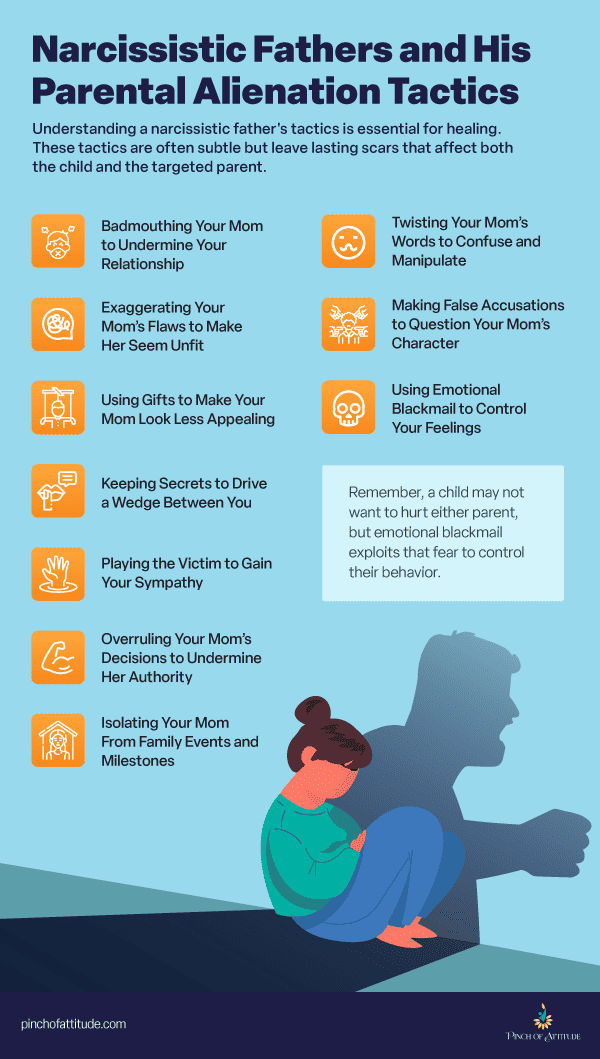Did your dad ever make you feel like your mom was the villain, whispering doubts about her love and painting himself as the misunderstood hero?
I’m talking about bedtime stories filled with subtle digs at the other parent, weekend visits marred by guilt trips, and holidays dominated by one-sided narratives.
This is the insidious reality of narcissistic father parental alienation, where a father subtly manipulates his children against the other parent.
It’s a heartbreaking dance of distorted memories and fractured relationships, which, sadly, leaves the children caught in the crossfire.
But before despair takes hold, let’s arm ourselves with knowledge.
Are there signs to watch out for when one parent may be enacting this emotional sabotage?
More importantly, what steps can you take to heal from it?
- Narcissistic manipulation can feel suffocating, but you have the power to break free. You’re stronger than you think.
- Healing takes time, but it’s possible. Reconnecting with your other parent after alienation can feel daunting, but start slow and focus on open communication.
- Therapy is a powerful tool. If you’ve been affected by parental alienation, don’t hesitate to reach out for professional help.
Table of Contents
What Is Parental Alienation by a Narcissistic Father?

Narcissistic father parental alienation is a complex and damaging dynamic.
In this situation, a father with narcissistic traits engages in a pattern of behavior designed to estrange his child from the other parent.
It falls under the umbrella of parental alienation syndrome, a term coined by child psychiatrist Richard Gardner in the 1980s.
Parental alienation syndrome occurs when one parent actively manipulates the child to change his perception toward the targeted parent.
The narcissistic parent may paint the other as unreliable, unloving, or even dangerous, all while positioning themselves as the sole figure of stability and affection.
The goal is to sever the emotional connection with the targeted parent so that the child may become isolated and reliant on the manipulator.
What Are the Root Causes of Narcissistic Father Parental Alienation?

Understanding what drives a narcissistic father towards parental alienation is like deciphering the internal map that guides him through the emotional labyrinth he constructs.
While the specific motivations can vary, several common root causes often lie at the heart of this destructive behavior:
- Deep-seated insecurity and envy: Parental alienation may come from a narc’s insecurity and envy. A narcissist can perceive any challenge to their image as a threat, including the healthy bond between a child and the other parent.
- Inability for empathy and emotional intimacy: A narcissist father cannot understand the child’s emotional needs. Instead, he focuses on manipulating those needs to serve his own agenda, which leads to parental alienation.
- Need for control and domination: For a father with narcissistic personality disorder, parental alienation is a calculated tactic. He wants to dominate and control, so he sows discord between the alienated parent and the child.
- Revenge and punishment: A narcissistic person may weaponize parental alienation as a form of revenge against the targeted parent. He may view the child’s estrangement as a victory, a punishment for perceived slights or betrayals.
These root causes, acting individually or in combination, create the fertile ground for narcissistic father parental alienation to flourish.
At the heart of it all lies the skewed self-perception of a person with narcissism.
That said, even when narcissism is not a factor, parental alienation can still occur for a variety of reasons.
Often, it stems from the intense emotions and conflicts surrounding separation and divorce.

What Are the Common Tactics Used by Narcissistic Fathers in Parental Alienation?

Understanding how a narcissistic father operates is an important step towards dismantling their destructive power.
These tactics are often subtle and insidious, but they can leave devastating scars on both the child and the targeted parent.
1. Badmouthing Your Mom to Undermine Your Relationship
Imagine your dad constantly complaining about your mom.
Every little thing becomes a reason to badmouth her: her cooking, her clothes, even the way she laughs.
These brainwashing tactics gnaw away at the foundation of the relationship between a child and his mom.
You start questioning her actions and doubting her love.
Over time, the cracks widen, and the image of a reliable, loving parent you once held starts to crumble.
2. Exaggerating Your Mom’s Flaws to Make Her Seem Unfit
Ever heard your dad say, “Mom’s never home, she can’t even keep a houseplant alive, how can she take care of you?”
It’s not just a comment on your mom’s gardening skills, it’s a calculated exaggeration to paint her as incompetent and unfit.
In a child custody case, for example, this might escalate to false allegations of child abuse, painting you as a victim to gain leverage.
Each overblown flaw, each fabricated incident, becomes a weapon that can potentially impact visitation rights and custody decisions.

3. Using Gifts to Make Your Mom Look Less Appealing
Does your dad shower you with lavish gifts and weekend trips, while subtly putting down Mom’s simpler offerings as boring or cheap?
When a narc parent rewards his child, its often done to make the other seem less appealing.
It’s not about genuine generosity, but about manipulating your emotions and painting one parent being the “fun” provider while the other is less exciting.
But true love doesn’t come with a price tag. It’s not about who showers you with the most stuff, but who truly understands and cares for you.
Be wary of gifts that come with strings attached.
4. Keeping Secrets to Drive a Wedge Between You
“Don’t tell Mom I let you stay up late watching movies, it’s our little secret.” Sounds harmless, right?
In reality, these secret-sharing sessions damage trust, driving a distance between you and your parent without them knowing.
They create a sense of exclusivity with your dad, making you feel like you’re part of a special club, a team against your mom.
The more secrets, the wider the wedge grows, making it harder to confide in your mom and building walls of mistrust.
5. Playing the Victim to Gain Your Sympathy

A parent with narcissistic tendencies often paints himself as the victim, the wronged hero in a fabricated tale.
This manipulative tactic aims to pit the child against the other parent by evoking your sympathy.
He spins a narrative where your mom is the villain, the one responsible for your “unhappy” moments.
He might even fabricate incidents, twist memories, or tell half-truths to solidify his victimhood.

6. Overruling Your Mom’s Decisions to Undermine Her Authority
Picture this: You’re grounded for staying out late, a consequence set by your Mom.
But then your Dad swoops in, pats your shoulder, and declares, “Don’t worry, you can stay over at my place tonight. Mom’s just being unreasonable.”
This seemingly casual overruling is a potent tactic in narcissistic parental alienation.
By disregarding your Mom’s decisions, your Dad undermines her authority and paints her as inflexible and uncaring.
Instead, he positions himself as the good parent, the one who prioritizes your happiness (or at least, the immediate version of it) over what might be in your best interest.
7. Isolating Your Mom From Family Events and Milestones
A narc parent uses this tactic to subtly exclude the other from family events and milestones, especially if they’re divorced.
This can be done through passive-aggressive means like not inviting her, making excuses for her absence, or even subtly sabotaging her plans to attend.
The goal is to create a sense of normalcy around your mom’s absence, making it seem like her exclusion is the natural order of things.
But true family includes everyone, not just those who fit a certain narrative.
Don’t let calculated exclusions manipulate your perception of your Mom’s love and support.
8. Twisting Your Mom’s Words to Confuse and Manipulate
Imagine your mom saying, “No cookies before dinner, sweetie.”
The alienating parent may tell their child, “See, Mom doesn’t care about you having fun. She just wants to control you.”
This subtle twist, a common tactic in psychological manipulation of a child, aims to sow seeds of doubt and confusion.
It plays on their developing understanding of language and emotions, creating confusion and doubt about the targeted parent’s intentions.

9. Making False Accusations to Question Your Mom’s Character
“Did your Mom really forget to pick you up from soccer practice again? Maybe she wasn’t thinking about you at all.”
These seemingly innocent doubts, planted like seeds, can blossom into full-blown accusations over time.
By subtly suggesting neglect, irresponsibility, or even worse, your Dad manipulates your opinions about the other parent.
But don’t let him or others dictate your image of your Mom.
Remember, accusations, especially unsubstantiated ones, are powerful tools. They paint a negative picture without offering proof, leaving you to fill in the blanks.
10. Using Emotional Blackmail to Control Your Feelings
Has your Dad ever told you, “If you tell Mom about that new video game, she’ll think you don’t love her anymore” or something similar?
This veiled threat, a classic tactic in emotional blackmail, aims to tell the child that the other parent doesn’t love them without conditions.
In doing this, the narcissistic parent exploits your natural desire to please and fear of rejection.
You then feel a sense of obligation and guilt, making you hesitate to do anything that might jeopardize your Dad’s approval.
Remember, a child may not want to hurt either parent, but emotional blackmail exploits that fear to control their behavior.
What Are the Long-Term Effects of Parental Alienation by a Narcissistic Father?

The effects of narcissistic parental alienation syndrome can echo throughout a child’s life.
The constant barrage of negativity and manipulation directed at the targeted parent and done in front of the child creates a distorted reality.
Torn between their love for both parents but ultimately feeling like they must choose sides, the child suffers.
The child may develop anxiety, depression, and low self-esteem, as he struggles with feelings of guilt and confusion.
A child affected by parental relationship distress may also develop attachment issues.
He may fear rejection and intimacy due to the warped perception of relationships he has witnessed.
Another possible impact of parental alienation is that the child may adopt his dad’s manipulative tactics, continuing the cycle of dysfunction in future relationships.
Ultimately, whichever way you look at it, the child is the victim in any form of parental alienation.
How Do You Know if You’ve Been Subjected to Your Narcissistic Father’s Parental Alienation?

You already know the answer to, “What is parental alienation by narcissistic father?”
Now, it’s time to ask the more important question: have you, unknowingly, been a victim of parental alienation or PA?
Knowing the long-term impact of narcissistic parental alienation paves the way for crucial self-reflection.
Recognizing the subtle signs of parental alienation lurking beneath the surface is the first step towards healing and reclaiming your narrative.
Can you relate to any of these?
You’re Always Blamed for His Emotional Upsets
Dad throws a tantrum because you forgot to walk the dog? Suddenly, it’s all your fault for ruining his day.
The constant blame game, where a narcissistic parent often makes you the emotional scapegoat, is a telltale sign of parental alienation.
Your Feelings Are Ignored or Belittled by Him
Anyone who has experienced or is experiencing parental alienation knows the sting of having their emotions invalidated and their concerns belittled.
It’s when your Dad calls you “overdramatic” and dismisses your emotions as childish.
You’re Pressured to Reject Your Other Parent
In narcissistic father parental alienation, the Dad’s goal is to isolate the child from the other parent. He’d force you to choose sides, creating an “us vs. them” mentality.
If you feel pressured to isolate one, it’s time to step back and reassess the dynamics at play.
Your Father Expects Unquestioned Loyalty and Agreement
Dad’s opinions are gospel, and any dissent is met with a cold shoulder or a veiled threat. You’re expected to parrot his views, even when they clash with your own.
This demand for unquestioned loyalty and agreement creates an environment where the alienated child feels they must walk on eggshells to avoid disapproval.
He Manipulates You to Control Your Relationships
Does your Dad subtly sow seeds of doubt, turning harmless connections into threats to his control?
For example, your friends suddenly become “bad influences” because they talk to your Mom. This manipulation, often a form of emotional abuse, is another sign of PA.
What Can You Do to Deal With Your Narcissistic Father’s Parental Alienation?
Recognizing the signs of parental alienation is a crucial first step, but what can you do next?
Dealing with parental alienation orchestrated by a narcissistic father can be a challenging journey, but it’s important to remember that you’re not alone.
Here are some strategies to consider:
Step 1: Seek Professional Counseling for Emotional Support
Learning how to handle narcissistic parental alienation can feel overwhelming.
If you’re alienated from a parent because of your narcissistic dad, consider seeking support from a mental health professional.
They can equip you with coping mechanisms, validate your experiences, and guide you through rebuilding healthy relationships.
Step 2: Maintain Your Own Mental Health and Self-Care
Prioritizing self-care empowers you to cope with narcissistic abuse and emerge stronger.
Nourish your mind and body with activities you enjoy, like spending time in nature, practicing mindfulness, or connecting with supportive people.
Step 3: Keep Open Communication Lines With Other Family Members
Reach out to trusted family members who haven’t been drawn into the conflict.
These connections can offer understanding, validation, and even a lifeline if you need to leave a narcissistic environment.
Related Posts:
- Narcissist Parent: How I Understood and Protected Myself From Their Toxic Traits
- Narcissistic Family Triangulation: What Is It, Signs, and How Do I Personally Respond?
- 13 Narcissist Father Traits You Don’t Expect to See
- Narcissistic Enablers in Your Family: Signs, Roles & How I Deal With Them
- Narcissistic Family Roles: I Was the Invisible Child and I Loved It!
Frequently Asked Questions
How does a narcissistic father engage in parental alienation?
A narcissistic father may manipulate the child’s perception by vilifying the other parent. He undermines their relationship through subtle control, gaslighting, or creating a false narrative.
Can parental alienation by a narcissistic father be reversed?
Yes, with professional intervention, therapy, and support, parental alienation by a narcissistic father can be addressed and potentially reversed over time.
How do you maintain a healthy relationship with your other parent despite a narcissistic father’s alienation attempts?
Prioritize self-care, seek support, and set boundaries. Communicate openly with your other parent so you can rebuild trust on your own terms.
How can you rebuild your relationship with a parent after being alienated by a narcissistic father?
Start slow and prioritize open communication. Focus on shared experiences and rebuild trust patiently. Healing takes time, but reconnecting is possible.
Can therapy help children affected by narcissistic parental alienation?
Seeking therapy with a child psychologist is the best way to deal with narcissistic parental alienation. It helps them process difficult emotions and develop healthy coping mechanisms.



